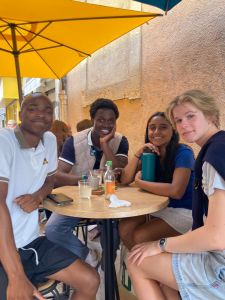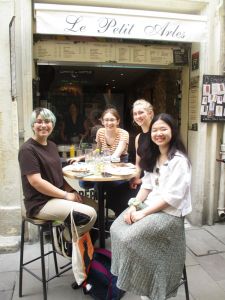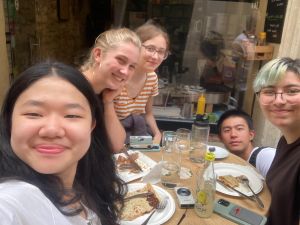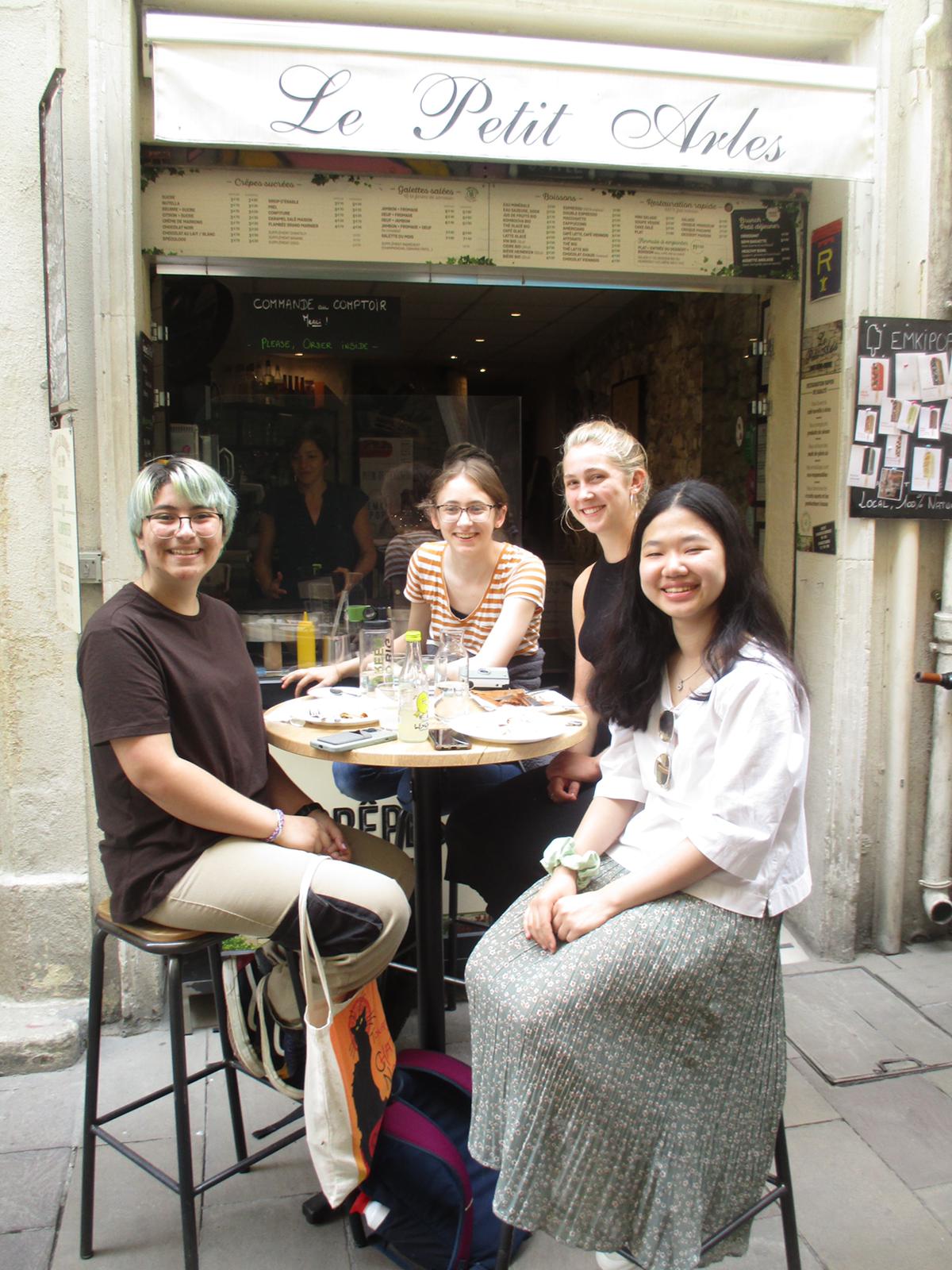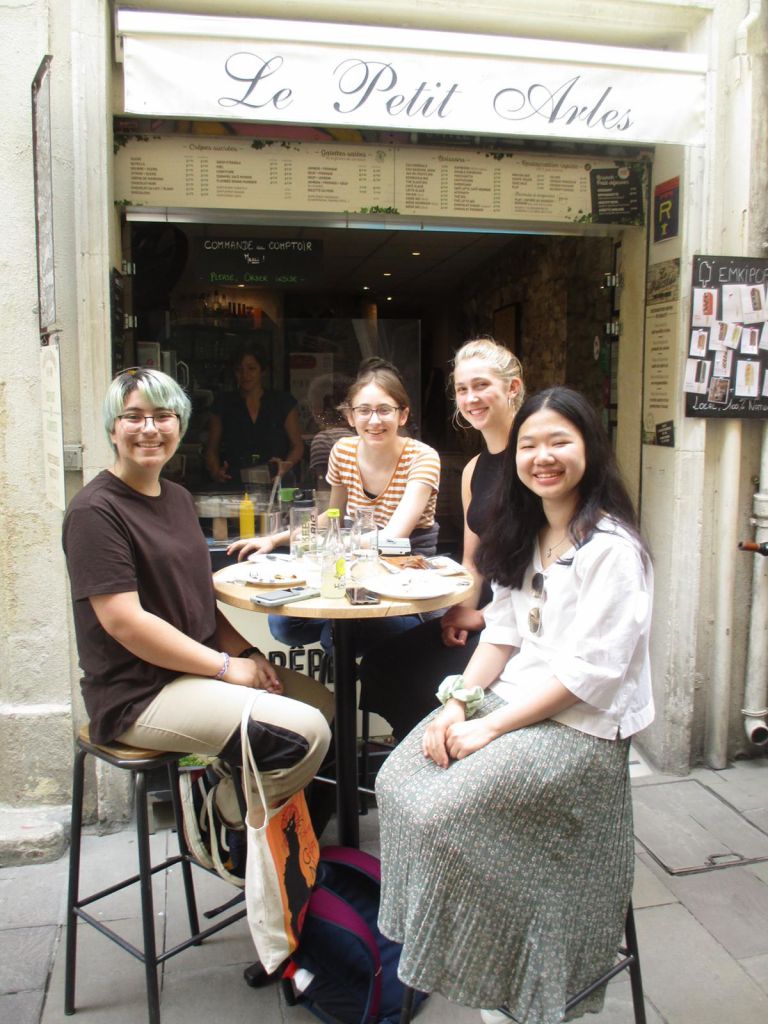Elizabeth ’24, reflects on the great experiences she’s had thus far with her homestay family and the privilege of being understood.
One thing très important that I have learned about France: there is never too much cheese! I continue to be mildly amused and very, very pleased that after each meal chez ma famille d’accueil (at the house of my host family), my host father asks me if it’s time for cheese. And take my word for it—it is always time for cheese. One of the practices I would love to take with me back home is having a vegetable-packed dinner with cheese at the end.
In addition to grocery stores, you can find le fromage at the Arles market. Whether or not you like hard cheese or soft cheese, strong cheese or weak cheese, moldy cheese or crumbly cheese, the market at Arles has it all. I began my Saturday morning at le marché with my host father and host brothers, Armel and Jules (ages 6 and 4, respectively). Every Wednesday and Saturday, farmers, bakers, artisans, and vendors set up their tents, which span across several streets downtown. When I visited on Saturday, I was overwhelmed by the volume of the market. The colors of the fabrics being sold, the scents of lavender and cheese, and the noise of hundreds of people make the Arles market loud and mildly chaotic. However, despite the din, I found it exciting and interesting. My host family and I bought some of the most beautiful organic produce I had ever seen, and I spent the rest of the morning perusing the stalls.
My host family and I spent the rest of the weekend going on various outings to nearby locations: the beach, the house of a friend of my host mother for an apéro dînatoire, and a nearby town for a rail cycle (a pedal-powered “car” on an old railroad track). My host family is incredibly thoughtful and very patient with me as I try to describe the words I do not know, and it is a fun experience to trade stories about cultural differences with my host parents (Jeanne and Cyril).
On Monday, I started my day by walking to school with Daphne, who lives just a few houses down from me just outside of downtown Arles. In class, we talked about French songs by artists such as Gaël Faye and Edith Piaf and presented our host families. After the morning session, we had an hour free to roam about the city. Svetlana, Sammy, and I walked to Vivotto, a gluten-free café downtown, and ran into Mr. Romick on the way. In France, whenever you walk into a café, restaurant, or store, it is customary to give a quick “Bonjour!” La bise, or the French greeting that involves kissing the air next to someone’s cheek, is not necessary in this context, but here in Arles, people give three kisses instead of the typical two.
After our little break, we had a language lunch at a restaurant in town. My lunch group dined at Le Mangelire, a little bistro with several bookshelves filled with des romans (novels) and des jeux de société (board/card games). The food (a quiche, salad, vegetables, and a chocolate mousse-cake for me) was delicious, and I can safely say that Le Mangelire is now one of my favorite restaurants of those I have visited in Arles.
During the afternoon, we visited the site of an old Roman bathhouse that would have been open free of charge to all citizens of Arles. The Thermes, as it is called, was much more than a place to bathe—many Romans would have played games and conducted business in the bathhouse. Additionally, we toured Les Cryptoportiques, a now-underground tunnel beneath La Place de la République. As the root “crypto” suggests, this area would have been ‘hidden’ slightly lower than the rest of Arles’ Forum during Roman times. The group had a lot of fun touring the damp and slightly spooky cryptorportiques.
So far, my voyage à Arles has been an amazing experience. I have found it humbling to have to speak a second language 100% of the time; it is challenging to not have the privilege that I realized I take for granted—that is, the privilege of being understood. I have a lot of respect for anyone who lives in a country with a different official language than their mother tongue and must constantly work to know what people are saying and to have others understand them. My homestay experience has been rewarding thus far, and I am proud of how well the group has adapted to speaking French.
